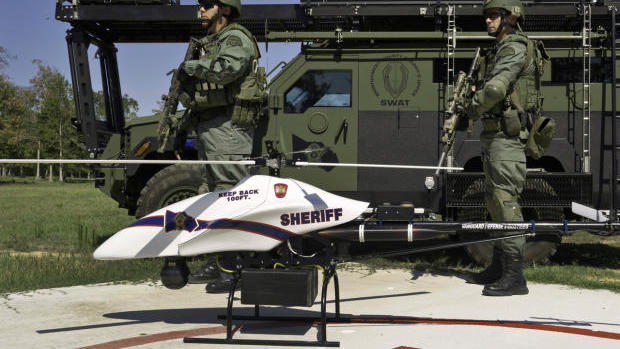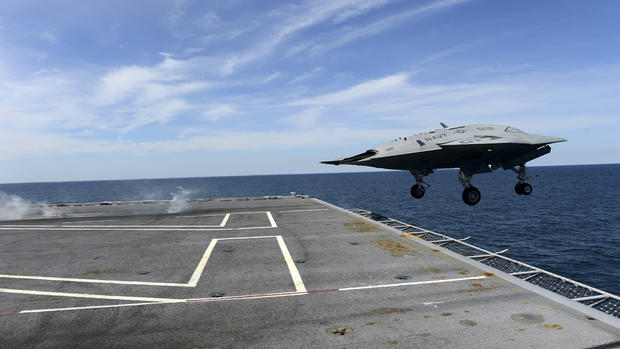Amnesty International protests U.S. drone killings
NEW YORK A top human rights organization on Wednesday criticized the Obama administration's increasing use of drone aircraft for the targeted killing of terrorism suspects overseas and questioned whether it is legal.
Amnesty International, in its global review of human rights issues, said the U.S. drone policy is shrouded in secrecy but the killings appear to amount to extrajudicial executions that violate international rights laws.
"Our view is that the legal basis is quite unclear," Salil Shetty, the London-based group's secretary general, said in a telephone interview with The Associated Press. "We have issues with how the United States defines the `theater of war,' which is a very broad definition which allows them a free reign to use drones and other weapons under a very wide set of circumstances."
Shetty criticized the secrecy surrounding the drone strikes.
- Who were the 4 U.S. citizens killed in drone strikes?
- Attorney General Holder: Drones killed 4 Americans since 2009
"Our researchers, when talking to people in Pakistan, find that the people are living in constant fear in very remote areas. You really cannot figure out, at the end of the day, who has been injured or killed in a drone attack," he said.
In its report, Amnesty said "available information, limited by secrecy, indicated that U.S. policy permitted extrajudicial executions in violation of international human rights law under the USA's theory of a `global war' against al Qaeda and associated groups."
Obama is expected to address his administration's reliance on drone strikes in a speech Thursday at the National Defense University. The U.S. State Department did not immediately respond to a request for comment on Amnesty International's report.
On the eve of Obama's speech, Attorney-General Eric Holder acknowledged for the first time that four American citizens have been killed in drone strikes since 2009 in Pakistan and Yemen.
The U.S. government has targeted and killed one American citizen, Anwar al-Awlaki, and is aware of the killing by U.S. drones of three others, Holder said in a letter to the chairman of the Senate Judiciary Committee. Holder said the three other Americans killed by drones were not targeted. They were Samir Khan, who was killed in the same drone strike as al-Awlaki; al-Awlaki's 16-year-old son, Abdulrahman, who also was killed in Yemen; and Jude Kenan Mohammed, who was killed in a drone strike in Pakistan.
An official with the U.S. mission to the United Nations, commenting on a U.N. investigation of U.S. drone policy, previously said the strikes "are conducted in full compliance with the law."
"The United States government has publicly acknowledged that it conducts targeted strikes, sometimes using remotely piloted aircraft, against specific al Qaeda terrorists," said the official, who was not authorized to speak publicly about the issue and spoke on condition of anonymity.
Civil liberties groups and an unusual coalition of Democratic and Republican lawmakers have criticized the White House for keeping most details of the drone program secret. Particularly concerning for these critics has been the administration's rare use of drones to kill American citizens overseas.
Drone strikes have risen under Obama. According to the Long War Journal, which tracks such attacks, there were 35 strikes in Pakistan during 2008, the last year President George W. Bush was in office. That number grew to 117 in 2010, then fell to 64 in 2011 and 46 last year.
The program has killed a number of top militant commanders, including al Qaeda's then-No. 2, Abu Yahya al-Libi, who died in a drone strike in June.
The American Civil Liberties Union has filed lawsuits against the United States over the drone attacks that killed three U.S. citizens in Yemen in 2011.
The United States is expected to increase its use of drones and other counterterrorism techniques as the war in Afghanistan winds to a close at the end of 2014 and the vast majority of U.S. troops return home.
Amnesty International also questioned the increasing reliance by U.S. police of Taser stun guns. The group said "tasers have been listed as a cause or contributory factor in more than 60 deaths" in the U.S. since 2001.
"Most of those who died after being struck with a Taser were not armed and did not appear to pose a serious threat when the Taser was deployed," the report said.
Amnesty said that in May 2012, "the American Heart Association published a report which presented the first scientific, peer-reviewed evidence concluding that Tasers can cause cardiac arrest and death."
Scottsdale, Arizona-based Taser International Inc. disputed the American Heart Association's findings at the time, saying it was based on just eight case studies. Some 16,000 agencies worldwide use Tasers, and many police departments say it is a valuable alternative to pulling a gun to try to subdue a suspect.


